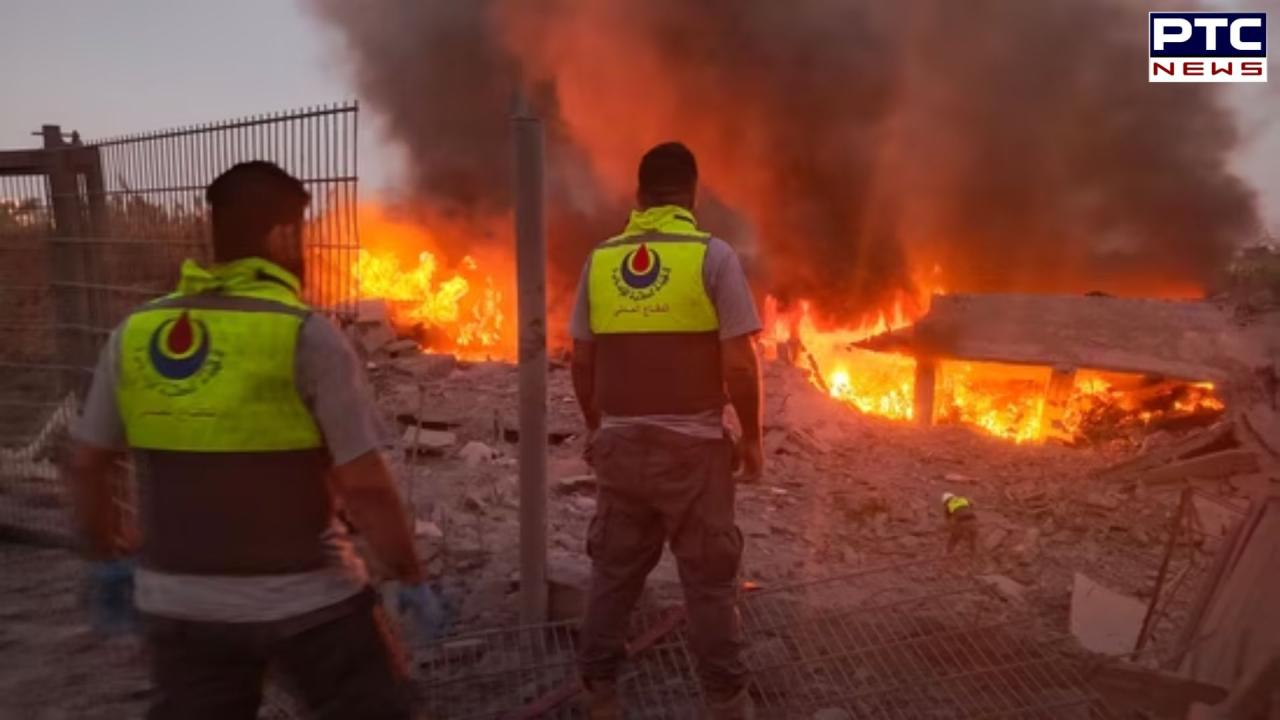Lebanon: Hezbollah commander killed in Israeli airstrike, death toll reaches to 558 | Latest Updates
Hezbollah-Israel conflict: Israel's new offensive against Hezbollah has invoked fears of escalating the year-long conflict between Israel and Hamas.

PTC News Desk: In a major escalation of the ongoing conflict, Israel launched its most extensive aerial offensive in southern Lebanon on Tuesday, killing at least 558 people, including 50 children, and injuring more than 1,800. The strikes targeted Hezbollah positions, intensifying fears of a broader conflict in the Middle East.
On Wednesday, Hezbollah confirmed that one of its senior commanders, Ibrahim Mohammed Kobeissi, was among those killed in the airstrikes. In a statement, Hezbollah honored Kobeissi, claiming he was “martyred on the road to Jerusalem” – a phrase commonly used by the group to describe fighters killed in Israeli attacks. Israel's military confirmed Kobeissi's death and announced that at least two other commanders from his unit were also "eliminated" in the strikes.
Regional and Global Repercussions
The recent airstrikes are raising concerns about a massive escalation in the nearly year-long conflict between Israel and Hamas, with the potential to destabilize the broader Middle East. Here's a breakdown of the latest developments:
1. UN Faces Triple Crisis: Philippe Lazzarini, the Commissioner-General of the UN Agency for Palestinian Refugees (UNRWA), warned that Israeli strikes in Lebanon, Gaza, and the West Bank are overwhelming the agency. "We already have Gaza and the West Bank as active frontlines. Now Lebanon is joining the crisis," Lazzarini said, adding that UNRWA is grappling with severe financial shortages, which further complicate its operations in the conflict zones.
2. Lebanese Casualties: Lebanese authorities reported that in the last two days alone, Israeli airstrikes have killed over 558 people and wounded more than 1,800, many of them in southern Lebanon and the Bekaa Valley, where Hezbollah is strongly entrenched. The civilian toll, especially among children, has intensified the urgency for diplomatic intervention.
3. International Diplomatic Push: French President Emmanuel Macron urged Iran, a key backer of Hezbollah, to use its influence to de-escalate the situation in Lebanon. During talks with Iranian President Masoud Pezeshkian, Macron emphasized Iran’s role in calming tensions and avoiding further destabilisation in the region.
4. Israeli Prime Minister's Address: Israeli Prime Minister Benjamin Netanyahu, while predicting “complicated days ahead,” reaffirmed Israel’s proactive approach to security. In a video message addressed to the Lebanese people, Netanyahu clarified that Israel's campaign was not aimed at civilians but at Hezbollah's military infrastructure. He urged civilians to leave the conflict zones, stating that Hezbollah has been using civilians as human shields by placing missiles in residential areas.
5. UK and US Responses: UK Prime Minister Keir Starmer called on British nationals to leave Lebanon immediately, warning that the situation could worsen rapidly. The UK has mobilized military personnel to prepare for potential evacuations, should the situation escalate further.
In his address to the United Nations, US President Joe Biden warned against the possibility of "full-scale war" in the Middle East. He urged for diplomatic efforts to resolve the conflicts in both Lebanon and Gaza. However, Lebanon’s Foreign Minister, Abdallah Bou Habib, expressed disappointment, calling Biden’s speech insufficient to address the region’s complexities.
6. Global Protests and UN Security Council Meeting: The United Nations Security Council has called an emergency meeting to discuss the rapidly deteriorating situation between Israel and Hezbollah. Meanwhile, in the United States, several cities, including New York, have seen protests against American military support for Israel. Demonstrators, carrying banners with slogans like "Hands off Lebanon now," gathered in Herald Square to voice their opposition.
As the conflict intensifies, world leaders are calling for restraint, but the likelihood of a broader war remains a significant concern. With Hezbollah confirming the loss of a top commander and Israel signaling no plans to scale back its operations, the road ahead looks increasingly fraught with danger.
Also Read: Jammu and Kashmir Phase 2 voting: All eyes on Omar Abdullah and other key contenders
